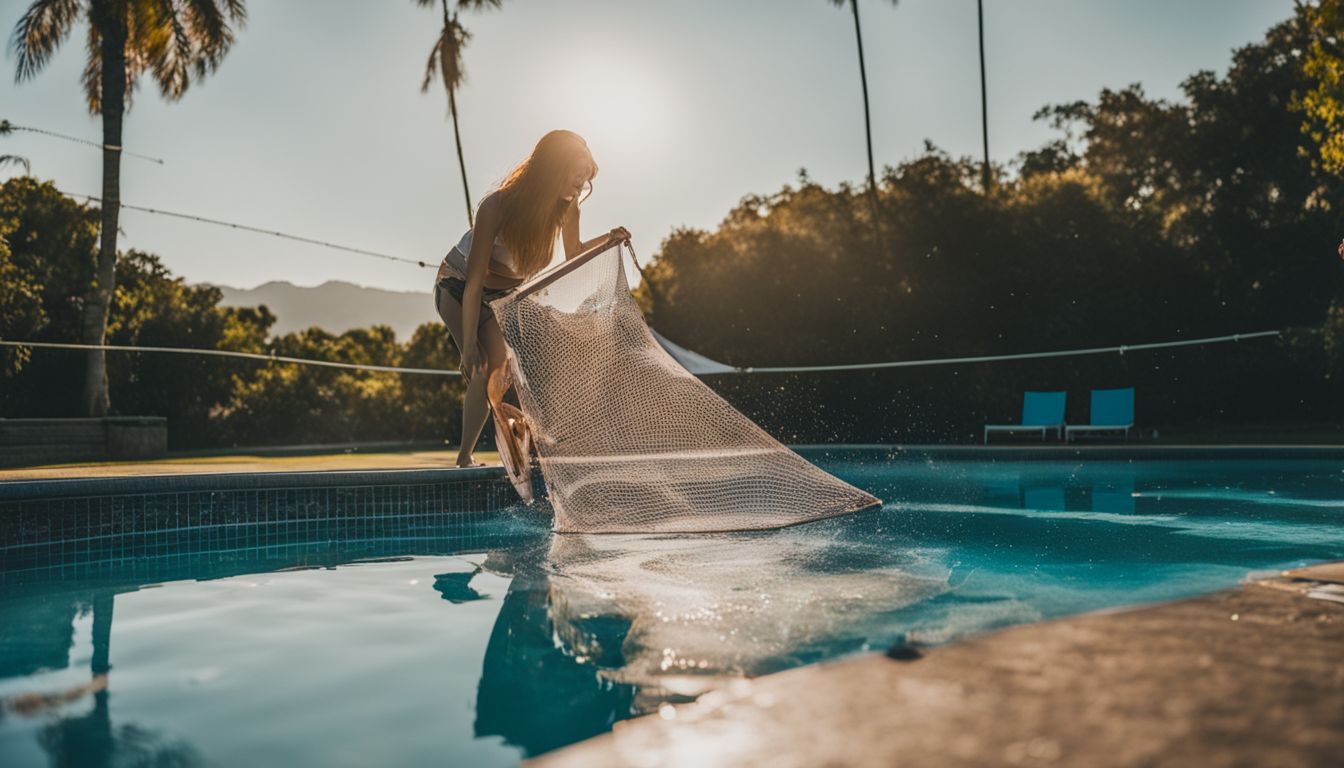Essential Tips For Swimming Pool Maintenance And Care

Are you struggling to keep your swimming pool crystal clear and inviting? Regular upkeep is vital for a healthy swimming environment. Our blog post provides essential tips that will transform your maintenance routine, ensuring crystal waters all season long.
Dive in for expert advice!
Key Takeaways
- Vacuuming for dirt and debris, maintaining water levels, cleaning the pool filter, monitoring water chemistry, and checking chlorine levels are crucial aspects of essential pool maintenance.
- DIY pool maintenance tips include testing your pool water often, using a skimmer net to remove leaves and bugs from the surface, keeping an eye on chlorine levels and pH balance, regularly skimming, brushing down the sides monthly, and checking equipment to prevent any big problems later on.
- Beginners should first get familiar with their pool's parts, such as the pump, filter system, and skimmer basket. It is important to check the water often for pH levels and chlorine while also carrying out regular tasks like skimming leaves off the surface of the water or vacuuming dirt from the bottom of the pool.
- Creating a schedule for regular cleaning tasks is crucial for efficient upkeep without missing any necessary tasks. This includes testing water quality 1-2 times each week, vacuuming regularly for dirt and debris removal, and daily monitoring of water levels.
Essential Pool Maintenance Tips

Vacuuming for dirt and debris, maintaining water levels, cleaning the pool filter, monitoring water chemistry, and checking chlorine levels are all crucial aspects of essential pool maintenance.
Vacuuming for dirt and debris
Keeping your pool free from dirt and leaves is simple with a good vacuum. It's like cleaning your carpet, but underwater. First, brush the walls and floor to loosen anything stuck there.
Then gently sweep the vacuum over the surfaces to suck up all the yucky stuff. This keeps water moving well and stops damage.
Vacuuming also stops algae from making your pool their home. Move the vacuum slowly to pick up more debris. Doing this often makes sure your pool stays sparkling clean for every swim! Make it part of your routine, and you'll always have a fresh place to dive in.
Maintaining water levels
It's important to keep the right amount of water in your pool. Too little water can harm your pool pump, while too much can mess with the chemicals that keep the pool safe and clean.
You might need to add more water if it gets low because of evaporation or after a lot of people swim. If there's been heavy rain, you may need to take some water out to get back to a good level.
Checking on your pool’s water level should be part of regular care. You want the water halfway up the skimmer box opening for the best results. Proper balance helps make sure your filter works well and keeps the chemistry of the pool correct for healthy swimming.
Plus, good maintenance stops bacteria from growing and makes sure swimmers are safe.
Cleaning the pool filter
Clean your pool filter every week to keep the water nice and clean. This is a big part of taking care of your pool. When you clean out the dirt and stuff from the filter, it works better and helps stop problems with your pool.
Make sure you also check on how the whole filter system is doing. A good, clean filter means your pool's water will be clear and safe for swimming. So don't forget about this important job each week!
Monitoring water chemistry
Keeping an eye on your pool's water chemistry is key. You've got to test the pH balance and other chemicals often. If the pH level isn't just right, swimmers might get itchy skin or red eyes, and your pool could turn into a mess.
Use a simple testing kit once a week to check everything.
You'll want to adjust things like chlorine and water stabilisers to keep the water clean and safe. This makes sure that your pool stays sparkling and healthy for everyone who jumps in.
After you're done with all that, it's time to check how much chlorine is in there.
Checking chlorine levels
After making sure the water's chemistry is balanced, it's time to focus on chlorine levels. This helps keep the swimming pool safe for everyone to enjoy. Chlorine fights germs and keeps the water clean.
You need just enough chlorine in your pool. Too much can hurt your eyes and skin.
To stay safe, check that your pool's pH level is between 7.2 and 7.6 so that the chlorine works best. Clean out strainer baskets each week to make sure there is good water flow and less chlorine needed.
Always use a reliable test kit to measure how much chlorine is in the water.
DIY Pool Maintenance Tips

DIY Pool Maintenance Tips
Test your pool water often; this means a couple of times each week. It's easy to do and stops algae from growing. Get a skimmer net and use it every few days to pick up leaves and bugs from the water surface.
This will make your pool look better right away.
Keep an eye on chlorine levels and pH balance; they're key for safe, clean water. If the pool level goes down, fill it back up so the pumps work well. Make sure you skim, brush, and vacuum each week too.
This way, dirt won't build up on walls or in the water. Stick with these simple tasks like surface skimming regularly, brushing down the sides monthly, and checking equipment to prevent any big problems later on.
Pool Maintenance for Beginners
Moving from do-it-yourself tips to pool care basics, beginners should first get familiar with their pool's parts. Learn about the pump, the filter, and where your skimmer basket is.
These are key to making sure your pool stays clean. You will need to check your water often. This means looking at pH levels and chlorine. It helps keep the water safe for swimming.
To start taking care of a pool, make sure you know how to use a net to take leaves off the surface of the water. Brushing walls stops algae from growing. Vacuuming picks up dirt from the bottom of the pool.
Don't forget to run your pump every day so that the water keeps moving and stays clear.
Keep an eye on how much water is in your pool too; after lots of swimming or heavy rain, you might need to add or remove some water. If you find this easy and fun, then keeping a clean and happy pool will be no problem!
Creating a Pool Cleaning Schedule
Plan and schedule regular cleaning tasks to keep your pool in top condition. Learn important tips for staying on track with your maintenance routine. Read more for essential pool care advice!
The importance of a schedule
Creating a pool cleaning schedule is crucial for regular maintenance and care of the swimming pool. It helps in planning out routine cleaning, chemical treatments, and other essential tasks to keep the pool in top condition.
By sticking to a scheduled maintenance plan, it becomes easier to ensure consistent upkeep and preventive maintenance, ultimately reducing the risk of major issues arising due to neglect.
With a well-organised schedule, the overall cost of pool maintenance can also be minimized, as regular upkeep helps prevent expensive repairs and replacements.
Remember that creating a regular maintenance plan is important because it allows for efficient upkeep without missing any necessary tasks. Consistent schedules make it easier to carry out routine care and chemical treatments, which can prevent more significant issues from occurring through regular services.
Frequency of cleaning tasks
To keep your pool sparkling clean, certain tasks need to be performed regularly. Testing the water quality should be done 1-2 times each week, ensuring it's balanced and safe for swimming.
Additionally, vacuuming the pool for dirt and debris and cleaning the filter on a regular basis are essential maintenance routines. Daily monitoring of water levels is also crucial to keeping the pool in optimal condition.
Finally, running the pool pumps for a few hours every day helps circulate and filter the water effectively.
Tips to stay on track
Creating a pool cleaning schedule is crucial to staying on top of maintenance tasks. By scheduling regular skimming, checking water levels, and cleaning the filter, you can ensure your pool stays clean and safe for swimming.
It's important to prioritise consistency and follow through with the schedule to maintain optimal swimming conditions.
The importance of a schedule helps in avoiding missed tasks or overdue maintenance. By setting specific frequencies for each task, such as weekly skimming and monthly deep cleans, you can keep your pool in top shape throughout the year.
Staying on track with your pool maintenance schedule ensures that you consistently provide a safe and enjoyable swimming environment for family and friends while extending the lifespan of your pool equipment.
Seasonal Pool Maintenance
To maintain your pool, managing seasonal changes is crucial. For instance, during the summer, watch out for water loss due to heat evaporation and splashing. To prevent this, keep a regular check on the water level.
Also, backwashing and vacuuming can lead to decreased water levels; hence, they must be monitored frequently in warmer months. Additionally, as part of seasonal maintenance, ensure proper management of the filter system and splash control to preserve your pool in the long run.
Advanced Pool Maintenance Tips
Invest in a solar pool cover to help maintain water temperature and reduce evaporation. Regularly check the filter system to ensure optimum performance, and consider shocking the pool as part of your maintenance routine.
Using a pool vacuum
To keep your pool clean, using a pool vacuum is crucial. Whether manually operated or automatic, regular vacuuming helps remove dirt, leaves, and other debris from the pool floor and walls.
Attach the vacuum to the filter system for effective cleaning. For above-ground pools, placing the vacuum in the middle ensures proper coverage of all areas.
Investing in a robotic pool vacuum like Barracuda or Kreepy Krauly can efficiently clean the bottom and sides of your pool. This removes any dirt or grime that has attached itself to those surfaces.
Inspecting pool covers
After using a pool vacuum, it's crucial to inspect your pool cover regularly. Check for tears, holes, and any damage to the cover straps. Also, look out for signs of wear or stretching that may reduce its effectiveness in keeping debris out.
Remember, maintaining your pool cover by promptly addressing any issues will help extend its lifespan and ensure it continues to protect your pool effectively.
Regularly monitoring the condition of your pool cover is essential for preventing debris from entering the water. Assessing the cover's integrity while cleaning will help you identify and address any potential problems early on.
Investing in a solar pool cover
When considering investing in a solar pool cover, it's essential to weigh the pros and cons. These covers help with energy efficiency by reducing heat loss through evaporation, thereby lowering maintenance costs over time.
Quality research is crucial before making an investment, as factors like heating speed and type play a significant role in maximising its benefits.
Prioritizing an efficient pool cover can save both time and money for any pool owner. It not only keeps the pool clean but also contributes to substantial energy savings while maintaining optimal water temperature.
Regularly checking filter system
To maintain a clean and hygienic swimming pool, it is crucial to regularly check the filter system. The pool filter plays a vital role in removing impurities from the water, such as dirt, leaves, insects, and other small objects.
By checking the filter pressure and backwashing if needed, you can ensure that the filtration system operates efficiently. It is recommended to clean the filter at least once a week to prevent clogging and maintain optimal water quality.
Regular maintenance of the pool's filtration system contributes significantly to creating a safe and enjoyable swimming environment for everyone.
Shocking the pool
When it comes to advanced pool maintenance, shocking the pool is a crucial step in keeping the water clean and sanitised. By using a specialist shock chemical product, typically chlorine-based, you can achieve a deep cleaning effect that eliminates contaminants and bacteria from the pool water.
This process helps to maintain proper chlorine levels for water sanitation, with a recommended range of 1-3 ppm. Pool shock treatment should be carried out according to guidelines provided by manufacturers and should be done regularly based on factors like pool usage and weather conditions.
Additionally, waiting up to 24 hours after shocking a pool before swimming ensures that the water is safe for use. The frequency of shocking your pool depends on various variables, such as size, usage patterns, and weather conditions.
Proper Pool Care for Safety
Ensure that you monitor water chemistry and keep the chlorine levels in check to prevent any potential dangers of neglecting maintenance.
Swimming tips and tricks
Keep the pool clean by regularly skimming off leaves and debris. Additionally, encourage swimmers to shower before entering the pool to reduce contamination. Remember, teaching children about pool safety and swimming skills can prevent accidents.
Ensure that swimmers are aware of suction hazards, such as strong suction from drains or skimmers, which can cause injury or drowning. Always supervise young or inexperienced swimmers while they're in the water and ensure they understand basic water safety rules.
Cleaning techniques
To keep your swimming pool clean, regular cleaning techniques such as skimming to remove debris and vacuuming to eliminate dirt are essential. Additionally, brushing the walls and tiles of your pool helps prevent algae buildup and keep the surfaces clean.
Scrubbing these areas offers a simple yet effective way to ensure proper pool maintenance.
By regularly implementing these basic cleaning techniques, you can maintain a sparkling and inviting pool for enjoyable swimming experiences.
Importance of water maintenance
Maintaining optimal pool chemistry is crucial to ensuring the safety and cleanliness of the pool water. Proper water maintenance, including regular testing, filtration, and sanitation, plays a significant role in preventing potential health problems associated with swimming pool use.
Neglecting water maintenance can lead to imbalanced chemical levels, poor hygiene, and an increased risk of infection. It is essential to prioritise pool water treatment and disinfection to create a safe and enjoyable swimming environment for everyone.
Potential dangers can arise from neglecting proper water maintenance. Without adequate care, the pool's chemical balance may become compromised, leading to an increased risk of contamination.
Potential dangers of neglecting maintenance
Neglecting pool maintenance can lead to serious problems. If you don't take care of your pool, it could get damaged, and the water might become unsafe. Badly maintained pools may develop structural issues, like corrosion and erosion, risking the pool's integrity.
Improper chemical balance can also cause health risks due to infections or skin irritations. It's important to keep up with regular maintenance to avoid these dangers.
Now let's dive into some essential DIY pool maintenance tips that will help you keep your swimming oasis in top condition.
Conclusion
In conclusion, maintaining a swimming pool involves regular cleaning, monitoring water chemistry, and keeping up with essential maintenance tasks. It's important to invest in the right equipment, such as a pool vacuum and filter, to ensure cleanliness.
Following a pool maintenance schedule is crucial for keeping the water safe and enjoyable for swimmers. By staying on top of these essential tips, you can ensure that your pool remains clean, safe, and ready for plenty of fun in the sun.
FAQs
1. How often should I clean my swimming pool?
You should aim to clean your swimming pool at least once a week, removing debris and using a pool vacuum to keep it clear.
2. Can I use regular household cleaning products for my swimming pool?
No, it's important to use specific pool cleaning chemicals and products to maintain the water quality and prevent damage to the pool surfaces.
3. What is the ideal pH level for a swimming pool?
The ideal pH level for a swimming pool is between 7.2 and 7.6, which helps ensure that the water is safe and comfortable for swimmers.
4. How can I prevent algae growth in my swimming pool?
Regularly adding algaecide, maintaining proper chlorine levels, and scrubbing the walls can help prevent algae growth in your swimming pool.
5. What safety measures should be taken when maintaining a swimming pool?
Always store pool chemicals out of reach of children, wear protective gear when handling chemicals, and regularly inspect all safety equipment such as fences and alarms around the pool area.












